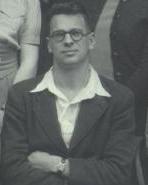
Back دايفيد ويلر (عالم تعميه من المملكه المتحده) ARZ David Wheeler German David Wheeler Spanish دیوید ویلر Persian David Wheeler (informaticien) French デビッド・ホイーラー Japanese David Wheeler Dutch David Wheeler Portuguese Дејвид Вилер Serbian
David Wheeler | |
|---|---|
 | |
| Born | David John Wheeler 9 February 1927[5] Birmingham, England |
| Died | 13 December 2004 (aged 77) Cambridge, England |
| Nationality | British |
| Education | University of Cambridge (MA, PhD) |
| Known for | inventing subroutines Burrows–Wheeler transform (BWT)[6] Tiny Encryption Algorithm (TEA)[7] Wheeler Jump[8] WAKE EDSAC[9] |
| Awards | Fellow of the Royal Society (1981) Computer Pioneer Award (1985) Fellow, Computer History Museum (2003)[1] |
| Scientific career | |
| Fields | Computer Science |
| Institutions | University of Cambridge Computer Lab, Cambridge Darwin College, Cambridge |
| Thesis | Automatic Computing With EDSAC (1951) |
| Doctoral advisor | Maurice Wilkes[2] |
| Doctoral students | |
David John Wheeler FRS (9 February 1927 – 13 December 2004)[10][11][12] was an English computer scientist and professor of computer science at the University of Cambridge.[13][14][15][16]
- ^ "David John Wheeler: 2003 Fellow". Computer History Museum. Retrieved 15 May 2020.
- ^ a b c d e David Wheeler at the Mathematics Genealogy Project
- ^ Li, Gong; Wheeler, David J. (1990). "A matrix key-distribution scheme". Journal of Cryptology. 2 (1): 51–59. CiteSeerX 10.1.1.51.1279. doi:10.1007/bf02252869. S2CID 30468228.
- ^ Hopper, Andy (1978). Local Area Computer Communication Networks (PhD thesis). University of Cambridge.
- ^ Campbell-Kelly, Martin (2004). "Wheeler, David John (1927–2004)". Oxford Dictionary of National Biography. Vol. 1 (online ed.). Oxford University Press. doi:10.1093/ref:odnb/94633. (Subscription or UK public library membership required.)
- ^ Burrows, Michael; Wheeler, David J. (1994), A block sorting lossless data compression algorithm, Technical Report 124, Digital Equipment Corporation
- ^ Wheeler, D. J.; Needham, R. M. (1995). "TEA, a tiny encryption algorithm". Fast Software Encryption. Lecture Notes in Computer Science. Vol. 1008. p. 363. doi:10.1007/3-540-60590-8_29. ISBN 978-3-540-60590-4.
- ^ Wheeler, D. J. (1952). "The use of sub-routines in programmes". Proceedings of the 1952 ACM national meeting (Pittsburgh) on - ACM '52. p. 235. doi:10.1145/609784.609816. Archived from the original on 28 June 2015.
- ^ Wheeler, D. J. (1992). "The EDSAC programming systems". IEEE Annals of the History of Computing. 14 (4): 34–40. doi:10.1109/85.194053. S2CID 23064533.
- ^ Campbell-Kelly, M. (2006). "David John Wheeler. 9 February 1927 -- 13 December 2004: Elected FRS 1981". Biographical Memoirs of Fellows of the Royal Society. 52: 437–453. doi:10.1098/rsbm.2006.0030.
- ^ "David Wheeler, 1927–2004". Obituaries. Cambridge Computer Laboratory. Retrieved 21 July 2011.
- ^ "Professor David Wheeler". Obituaries. The Independent. London. 22 December 2004. Retrieved 21 July 2011.[dead link]
- ^ David Wheeler publications indexed by Microsoft Academic
- ^ Wheeler, D. J. (1994). "A bulk data encryption algorithm". Fast Software Encryption. Lecture Notes in Computer Science. Vol. 809. pp. 127–134. doi:10.1007/3-540-58108-1_16. ISBN 978-3-540-58108-6.
- ^ Hopper, A.; Wheeler, J. (October 1979). "Binary Routing Networks". IEEE Transactions on Computers. C-28 (10): 699–703. doi:10.1109/tc.1979.1675237. ISSN 0018-9340. S2CID 20076347.
- ^ Hopper, A.; Wheeler, D. (April 1979). "Maintenance of Ring Communication Systems". IEEE Transactions on Communications. 27 (4): 760–761. doi:10.1109/tcom.1979.1094451. ISSN 0090-6778.